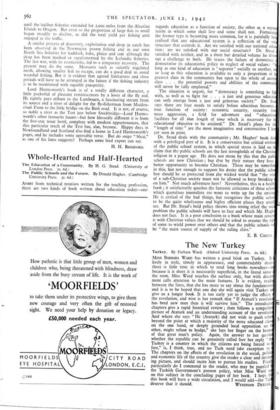Whole-Hearted and Half-Hearted
The Public Schools and the Future. By Donald Hughes. (Cambridge University Press. 3s. 6d.)
APART from technical treatises written for the teaching profession, there are two kinds of book written about education today—one regards education as a function of society, the other as a sep realm in which some shall live and some shall not. Fortunate the former type is becoming more common, for it is painfully be realised that any educational system is a reflection of the s structure that controls it. Are we satisfied with our national edu tion: are we satisfied with our social structure? Dr. Stead satisfied with neither, and in a short but detailed volume he thro out a challenge to both. He traces the failure of democracy democratise its educationai policy to neglect of social values: " long as one kind of education is ' superior' socially to another, so long as this education is available to only a proportion of greatest class in the community but open to the whole of anot class . . . the potential powers and abilities of the commu will never be fully employed."
The situation is urgent, for " democracy is something to fi with, as well as to fight for . . . a just and generous educati can only emerge from a just and generous society." Dr. St says there are four needs to satisfy before education becomes true function of society: economic security, security f mass aggression, a field for adventure and " educatio facilities for all that length of time which is necessary for educational objective to be attained." Dr. Stead's plans for " length of time " are the most imaginative and constructive I ha yet seen in print.
Dr. Stead deals with the community ; Mr. Hughes' book de with a privileged part of it. It is a conservative but critical estima of the public school system, in which special stress is laid on th claim that the public schools are the last strongholds of the Christia religion in a pagan age. He does not mean by this that the puhl schools are now Christian ; but that by their nature they have better opportunity to become Christian. There may be somethi in this, but not enough to support his desire that the public scht boy should be so protected from the wicked world that " the vol of a sub-Christian society must not be allowed to keep breaking on him." Not much adventure here! Nevertheless, this is a health book ; it satisfactorily quashes the fantastic criticisms of these schoo which querulous journalists are wont to write up for the envio He is critical of the bad things, but recognises the public sch to be the quite wholesome and highiy efficient places they usua are. But Dr. Stead's bold policy throws into strong relief the son problem the public schools will have to face and which Mr. Hugh does not face. It is a poor conclusion to a book whose main conce is with Christian values that we should be asked to assume the rig of some to wield power over others and that the public schools s be " the main source of supply of the ruling class."
E. B. CASTLE.


























 Previous page
Previous page